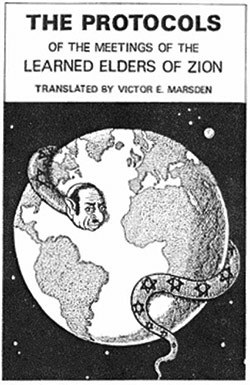 It’s time for the liberty movement and some people loosely associated with us to take a hard look at something that’s been ignored for too long. We have some vile bigots among us — and it’s time to speak the truth about it.
It’s time for the liberty movement and some people loosely associated with us to take a hard look at something that’s been ignored for too long. We have some vile bigots among us — and it’s time to speak the truth about it.
I tend to be very open-minded about the discussion that I’ll allow in forums that I control, whether it’s in the comments here or on Facebook. There are very, very few reasons for which I’ll block people or delete comments, but wholesale, outright bigotry is one of them.
Earlier today on Facebook, I posted a question for discussion that concerned where the concept of majoritarian superiority came from. Is it somehow a natural part of human psychology or did it come about at some point in history? (My guess was that it probably started somewhere during the Enlightenment.) One of my recently acquired acquaintances on there had this to say in response:
“It stems from the Jews. The Jews have manipulated history to advance their own worldview, whether to create sympathy or world domination.”
I want to make one this very clear. If you’re going to blame “the Jews” for random things and talk about their alleged worldview of “world domination,” you’re not a friend of mine. Period. No exceptions. If you don’t understand why that’s unacceptable, there’s no way I could possibly explain it to you. I’ll defend your right to set up your own enclave of bigots and live the way you choose, but we’re not really friends. That’s evil, and it goes too far for me to be able to ignore.
For too long, I think some of us have sat by uncomfortably and failed to confront things that need confronting among those who claim to stand for individual freedom. We’ve generally done it in the name of tolerance and accepting a person’s freedom to hold his or her own beliefs. But just because a person is legally and otherwise entitled to his own beliefs, that’s no reason for us to remain silent in the face of evil.
Not only is it a moral issue, but it also makes it appear that those who talk of freedom really just want the freedom to hate others more openly. That’s not the case with the vast majority of very decent, scrupulously fair and loving libertarians I’ve known. We don’t need to remain silent about the few who speak evil and make it appear that their evil is in our name, too.
 There’s a long history of anti-Semitism, and I’m not going to try to recount it. I wasn’t even aware that anti-Semitism still existed until sometime when I was a teen-ager, because I had been taught (in my very Southern Baptist family and church) that Jews tended as a group to value things that made them successful in the world. I knew that we disagreed with them, but I admired them because of what a small minority had been able to accomplish as compared to their relatively tiny numbers. It was a surprise to me when I got old enough to start understanding that some people still agree — somewhere in their hearts — that Hitler was generally right about the Jews.
There’s a long history of anti-Semitism, and I’m not going to try to recount it. I wasn’t even aware that anti-Semitism still existed until sometime when I was a teen-ager, because I had been taught (in my very Southern Baptist family and church) that Jews tended as a group to value things that made them successful in the world. I knew that we disagreed with them, but I admired them because of what a small minority had been able to accomplish as compared to their relatively tiny numbers. It was a surprise to me when I got old enough to start understanding that some people still agree — somewhere in their hearts — that Hitler was generally right about the Jews.
Over the centuries, people have used many excuses for hating Jews. The most ugly example is when Christians have tried to hold the Jews responsible — as a group of people — for the crucifixion of Jesus. It doesn’t seem to occur to these people that they couldn’t claim salvation through Jesus’ death and resurrection without this, and it also doesn’t seem to have occurred to them that it was clearly God’s plan, according to scripture. Nor does it occur to them that the Bible teaches that Jesus had to die because of everyone’s sins, so there’s zero theological basis for blaming Jews or any other group.
 The sad thing is that many who are otherwise decent, productive and exceptional people have been seduced by various kinds of bigotry. Henry Ford is the foremost example that comes to mind. Although Ford’s genius gave the world decent transportation at prices that were undreamed of before, he was virulently anti-Semitic. The newspaper he owned, The Dearborn Independent, sent a message of hate to its 700,000 paid subscribers. It even compiled much of the hate into various books, including, “The International Jew, the World’s Foremost Problem,” in 1920. It also published the infamous hoax called “The Protocols of the Elders of Zion,” which some people today still persist in believing might have been real.
The sad thing is that many who are otherwise decent, productive and exceptional people have been seduced by various kinds of bigotry. Henry Ford is the foremost example that comes to mind. Although Ford’s genius gave the world decent transportation at prices that were undreamed of before, he was virulently anti-Semitic. The newspaper he owned, The Dearborn Independent, sent a message of hate to its 700,000 paid subscribers. It even compiled much of the hate into various books, including, “The International Jew, the World’s Foremost Problem,” in 1920. It also published the infamous hoax called “The Protocols of the Elders of Zion,” which some people today still persist in believing might have been real.
We have people among us who believe that there is some Jewish conspiracy to control the world. As a matter of fact, we have people who believe all sorts of goofy conspiracies with no basis in factual reality. Just because someone shows some grainy footage of something that isn’t clear and then claims that it’s evil people plotting against us doesn’t mean the interpretation is accurate. (I can take footage of a group of people walking into a building and make it look shadowy and grainy and secretive — and make it look like it’s a conspiracy even if it’s just people walking into a church service.) If you want to believe in chemtrails or whatever your conspiracy is, go right ahead. I’ll leave you alone. You’re welcome to believe what you want to.
But if you’re attacking entire groups of people for their various conspiracies — especially groups which are typically or traditionally attacked, such as Jews, blacks, Muslims or gays — you need to realize that you are no longer seeing people as individuals. You’re seeing people as part of a collective. You’re doing something that’s no better than what the collectivists of the state do.
The truth is that people are individuals. People are just people. Some are evil. Some are good. Some want good things for others. Some want to destroy others. To think that one group is all one or all the other (or even mostly one or the other) is intellectually vapid and morally vile.
As a movement, I don’t think those of us favoring liberty have done enough to call out those among us who have made the rest of us look bad. We’ve ignored racists and anti-Semites and those who hate gays — and that needs to change. I don’t want to take away their right to hold evil views, even though they’re beliefs that have led to millions of deaths before. I’m an absolutist when it comes to your right to believe and say what you want. But I’m also an absolutist in saying that the point finally comes when decent people don’t allow themselves to be associated with evil, even passively. It’s time for more of us to take this issue seriously.
(As a side point, I want to make it clear that attacking the state of Israel isn’t the same thing as attacking Jews as a group. I’ve come to oppose what that state does, but it has nothing to do with the religion, culture or ethnicity of the people who live there.)
 As I told someone earlier about the issue on Facebook this morning, I’ll let people’s statements go pretty far, because I like a wide variety of opinions, even if I disagree with many of them. There are just a few things that I can’t allow in good conscience. I’ll defend their right to say whatever they want somewhere else, but not when I have the private right to stop it.
As I told someone earlier about the issue on Facebook this morning, I’ll let people’s statements go pretty far, because I like a wide variety of opinions, even if I disagree with many of them. There are just a few things that I can’t allow in good conscience. I’ll defend their right to say whatever they want somewhere else, but not when I have the private right to stop it.
It’s even different is someone is bashing a group I’m a part of. If someone wants to attack Baptists or southerners or libertarians, I’m generally going to let it happen, even if I point out the statement’s unfairness. But when someone is attacking groups I’m not a part of — and it’s a common prejudice — it feels as though I’m tacitly supporting it by not saying that it’s unacceptable. There’s a thin line between blocking dissent and showing disapproval of something evil, and we all draw our lines at different places about how to balance the competing interests. For me, though, the statement I quoted above that someone posted on my Facebook page wasn’t a close call.
You don’t have to agree with everyone. You don’t like to like everyone. You don’t have to link arms with others and sing “Kumbaya.” You don’t even have to respect everyone. But evaluate people as individuals, not as stereotypes to represent a group. We’re supposed to be a movement of individualists. Let’s see others as individuals, too.
It will help our movement — and it’s the right thing to do, too.
 Going through old relics tells me I’m still same person I used to be
Going through old relics tells me I’m still same person I used to be If you knew when you would die, would that affect how you lived?
If you knew when you would die, would that affect how you lived?